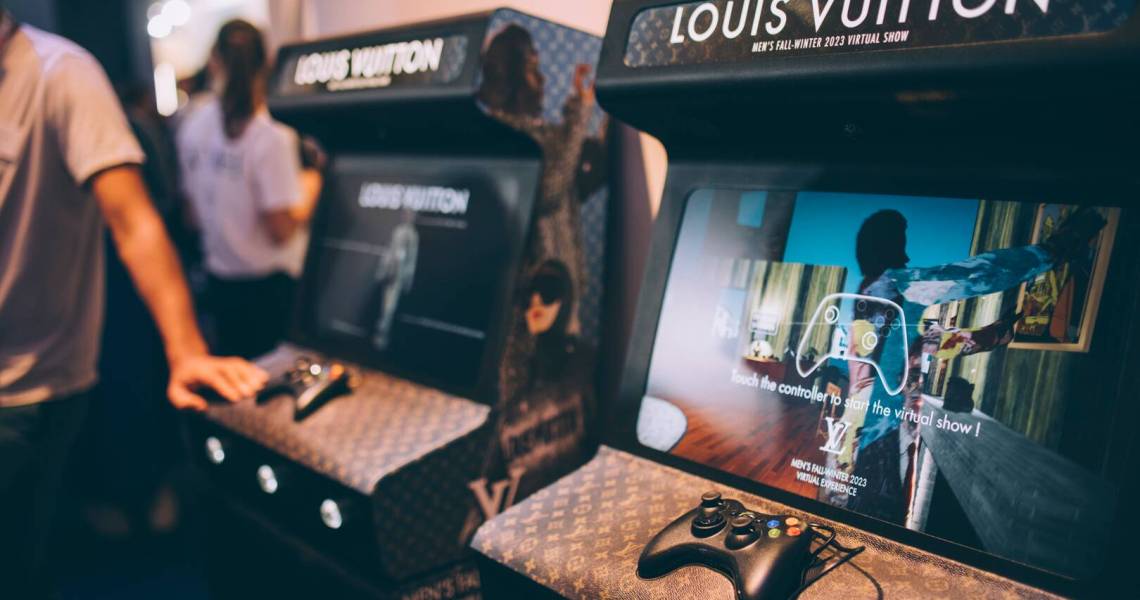This week, we take a deep dive into how the luxury conglomerate is approaching web3 through partnerships, community projects and investment. This comes ahead of the first Louis Vuitton show with Pharrell at the helm next week. Scroll down to use Glossy+ Comments, giving the Glossy+ community the opportunity to join discussions around industry topics.
LVMH, the conglomerate behind some of the biggest brands in fashion like Louis Vuitton and Dior, has made significant strides in partnerships this week. Apart from going into talks with the Olympics to add French flair to the 2024 Paris-based event, LVMH has also partnered with one of the biggest names in gaming, Epic Games. The move continues luxury’s relationship with immersive digital experiences and is a good indication of what kinds of partnerships are working for luxury players right now.
The partnership with Epic Games, announced on June 14, is set to create new immersive customer experiences and add new tools to its design pipeline using 3D technologies for all of its brands. These tools include Unreal Engine, a gaming creation tool that was recently used in Puma’s Black Station 2 launch. The tool can be used to create high-definition, realistic gaming experiences, new collections and ad campaigns. It has been on fashion’s radar as of late as the industry considers how to present its visual-heavy brands in digital environments that showcase them in the best light.
LVMH Group’s managing director Toni Belloni said that Epic’s tools will help the company “engage more effectively with younger generations who are very much at ease with these codes and uses.” However, LVMH is targeting more than just younger customers. Taking inspiration from the high net worth collectors in the art world, fashion companies like LVMH are hoping that web3 can help them target those affluent customers as well.
LVMH’s Louis Vuitton has done that through a uniquely expensive NFT project. On June 6, the brand launched digital collectibles through VIA Trunks that allow the brand’s super fans to receive special access to its future projects through a connected digital wallet, where invitations and announcements will be airdropped, as well as unique collections and access to events. The phygital trunks (physical and digital) had a limited launch of less than a hundred units on June 8, with a price tag of $42,000. They sold out within the day, and the company received more demand for the items than expected, according to a person familiar with the proceedings.
“If you look at the reaction that the Treasure Trunks announcement had across the fashion, Web3 and marketing industries, it’s very clear that those industries are closely aligned,” said LVMH Innovation Award winner Samir Addamine, co-founder and CEO of Absolute Labs, the first web3 wallet relationship platform. “Luxury brands are using their considerable influence to demonstrate to others what is possible. Every new campaign, collection or project is providing a framework or playbook for helping other brands embark on a journey into web3 of their own.”
Ad position: web_incontent_pos1
The VIA Trunks launch shows that accessibility doesn’t have to look the same everywhere for a fashion brand – Louis Vuitton has also done mobile games and other experiences aimed at a mass audience. Many other brands within digital environments have tended to lower the price of their digital items to bring more users on board rather than hyper-personalize their offering, like Richard Quinn offering $60 NFTs or Gucci offering its aviators on Roblox for 90 Robux, the equivalent of $7.
LVMH has also been continuously investing in new technology through its Innovation Award since 2017 and its LVMH Pavilion at the Viva Tech conference in Paris, where it exhibits its innovations each year. At the awards, Bernard Arnault, Chairman & CEO of the LVMH group, mentioned that “LVMH was also a startup some years ago.”
It’s this startup mentality, plus a growing responsibility for some of the biggest brands in the world, that makes LVMH’s investment a guide for the rest of the industry.
“Fashion leaders know that blockchain-based technologies, and even AI, represent something groundbreaking but are also being very deliberate in being sure that how they leverage those technologies will reflect well on both their legacies and future,” said Addamine.
Although partnerships with gaming companies and new web3 projects are flashy and could bring in new demographics, LVMH is also continuing to invest in companies that are building out more sustainable customer experiences as well.
Ad position: web_incontent_pos2
Its latest Innovation Award winner is Save Your Wardrobe, a 6-year-old company that offers a connected post-purchase experience for aftercare, including repairs and alterations, is one such company. It was announced as the winner on June 15.
“Save Your Wardrobe perfectly embodies LVMH’s commitment to creative circularity,” said Arnault at the awards ceremony.
“LVMH mentioned that the care put into constructing the garment and creating products is extremely important to them, and that aftercare should be just as outstanding,” said Hasna Kourda, who launched the company in 2017 and the aftercare app in 2020. Its B2B solution came in 2021 with Zalando. The company has since received $3 million in seed funding.
“For luxury brands, it’s important to have a uniform experience across all channels,” she said. LVMH and its award has become a key enabler for technological progress in the fashion space. With the awards support and insight into how to approach the LVMH brands, SYW will apply its platform to high-end jewelry and watches and is considering expansion into the Middle East.
Inside our Coverage
Google reveals it has no plans to monetize its AI try-on feature
Luxury Briefing: Inside 119-year-old Parisian brand Maison Ernest’s US expansion
Fashion brands evolve NFC tag strategies to provide more value, exclusivity
Want to discuss this with our editors and members? Join here, or log in here if you're already a member.




